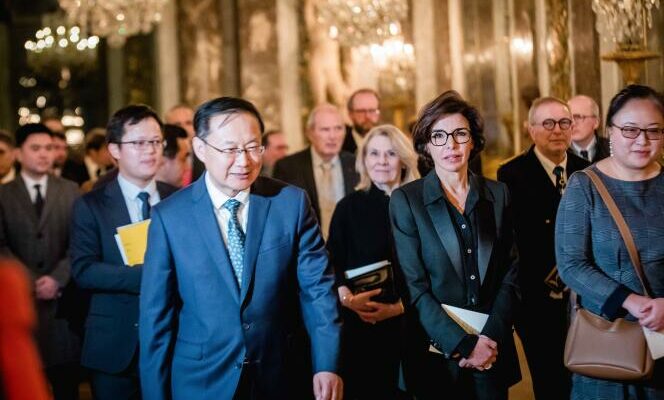Wednesday January 31, 8 p.m. Emmanuel Macron’s face appears on the big screen of the Royal Opera of Versailles, where six hundred guests await the kick-off of the 60e anniversary of Franco-Chinese diplomatic relations and the Franco-Chinese Year of Cultural Tourism. “ The openness of our two countries towards each other is essential”proclaims the French president. “Openness is the path to prosperity”adds, impassive, his Chinese counterpart, Xi Jinping, in a speech also filmed.
The staging of Franco-Chinese friendship, which culminated in a concert given by the National Orchestra of China and the Royal Opera of the Palace of Versailles, does without toasts and hugs. It comes down to a credo – “ the central role of culture in our bilateral relationship »according to the Minister of Culture, Rachida Dati – and to an objective which her Chinese counterpart, Sun Yeli, makes no secret of: the revival of tourism, which is slow to return to pre-Covid-19 levels.
But, objects a French diplomat wishing to remain anonymous, “if the theme chosen to celebrate the 60th anniversary is cultural tourism, it’s because we had nothing else to eat”. In order to attract foreigners, including the French, the Chinese authorities have announced a visa exemption for stays of less than fifteen days.
The reciprocal is not planned on the French side. But, to revive the “desire for France” among the Chinese, nearly two hundred cultural events will mark the year 2024, including an exhibition dedicated to the Palace of Versailles at the Forbidden City in Beijing, and tours of the Comédie-Française, the Bordeaux Opera Ballet and of tricolor musicals in several Chinese cities. The Mobilier national exports two exhibitions, “Napoleon’s Disappeared Palaces”, in March, to Beijing then to Shanghai, followed by “Le Chic! French decorative arts and furniture”, in partnership with the private audiovisual group Hantang. “We took a while to use the word “interest”, which the Chinese use without complexessummarizes Eva Nguyen Binh, president of the French Institute. Today, we accept it: it is in our interest to maintain mutual knowledge. »
Maintaining authoritarian power
An interest weighted by ethico-political considerations. Xi Jinping’s regime has toughened since the pandemic. Beijing introduced a draconian national security law in Hong Kong in 2020 and intensified its military pressure on Taiwan, which it vowed to bring back into its fold. And the repression of the Uighurs, a Turkish-speaking minority living in the west of the country, is not weakening. Artificial intelligence now makes it possible to constantly monitor each citizen. As for censorship, it is rife at all levels. “It’s suffocating. You don’t have any fresh air, it’s hard to breathe”explained to the British daily The Independent, in July 2023, Chinese dissident artist Ai Weiwei, who has not returned to China for nine years.
You have 80% of this article left to read. The rest is reserved for subscribers.
